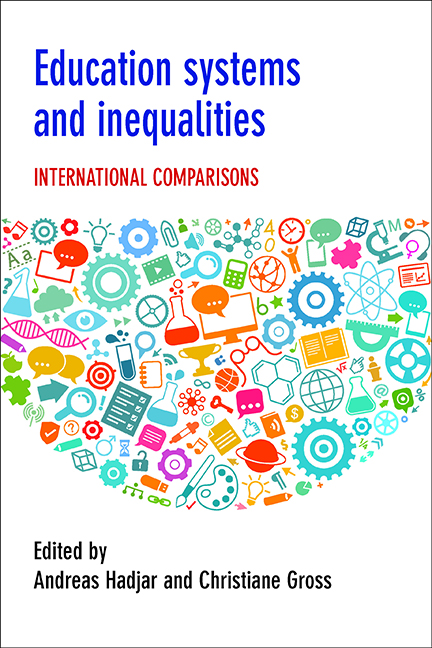Book contents
- Frontmatter
- Contents
- List of tables and figures
- Notes on contributors
- Acknowledgements
- Introduction: education systems and inequalities
- one Theorising the impact of education systems on inequalities
- two Comparing education policies in a globalising world: methodological reflections
- three Education systems and intersectionality
- four Measuring educational institutional diversity: tracking, vocational orientation and standardisation
- five Sorting and (much) more: prior ability, school effects and the impact of ability tracking on educational inequalities in achievement
- six Data analysis techniques to model the effects of education systems on educational inequalities
- seven Education systems and inequality based on social origins: the impact of school expansion and design
- eight Education systems and gender inequalities in educational attainment
- nine Tracking, school entrance requirements and the educational performance of migrant students
- ten From exclusion and segregation to inclusion? Dis/ability-based inequalities in the education systems of Germany and Nigeria
- eleven Education systems and meritocracy: social origin, educational and status attainment
- twelve Education systems and gender inequalities in educational returns
- thirteen Education systems and migrant-specific labour market returns
- fourteen Health returns on education and educational systems
- fifteen Good and bad education systems: is there an ideal?
- Conclusions and summary
- Index
Conclusions and summary
Published online by Cambridge University Press: 05 April 2022
- Frontmatter
- Contents
- List of tables and figures
- Notes on contributors
- Acknowledgements
- Introduction: education systems and inequalities
- one Theorising the impact of education systems on inequalities
- two Comparing education policies in a globalising world: methodological reflections
- three Education systems and intersectionality
- four Measuring educational institutional diversity: tracking, vocational orientation and standardisation
- five Sorting and (much) more: prior ability, school effects and the impact of ability tracking on educational inequalities in achievement
- six Data analysis techniques to model the effects of education systems on educational inequalities
- seven Education systems and inequality based on social origins: the impact of school expansion and design
- eight Education systems and gender inequalities in educational attainment
- nine Tracking, school entrance requirements and the educational performance of migrant students
- ten From exclusion and segregation to inclusion? Dis/ability-based inequalities in the education systems of Germany and Nigeria
- eleven Education systems and meritocracy: social origin, educational and status attainment
- twelve Education systems and gender inequalities in educational returns
- thirteen Education systems and migrant-specific labour market returns
- fourteen Health returns on education and educational systems
- fifteen Good and bad education systems: is there an ideal?
- Conclusions and summary
- Index
Summary
The most challenging work for editors is to summarise the main findings of the contributions. We start with the lessons learnt from each chapter in the main sections of the volume: theory and methods, education systems and educational inequalities, and education systems and inequalities in status attainment and life chances. From this we derive our main conclusion and end with an overview of what is needed for further comparative education research.
Lessons learnt from each chapter
Theory and methods
The first chapter of the theory and methods section (chapters one to six), written by Christiane Gross, Heinz-Dieter Meyer and Andreas Hadjar, provides evidence for path dependencies regarding the development of education systems, exemplified by the education systems in the United States and Germany. They illustrate the strong link between the processes of nation-building and the development of education systems. In a second step, they present a macro-meso-micro-model developed following the concept of Coleman (1990). Within this model, previous research into the question of how education systems shape the production of educational inequalities at the micro-level is summed-up.
Susan L. Robertson and Roger Dale dedicate their chapter to a critical review of comparative research, criticising the fact that comparative research often assumes, but never problematises and reflects on, the empirical comparability of different education systems, and that comparative studies – here the PISA (Programme for International Student Assessment) studies function as an example – tend to evaluate education systems, but do not attempt to understand and explain their nature. This critical look back may widen the perspective on the subject and allow a broader view, not focusing on finding the right answers for our research questions, but on asking the right questions.
The chapter by Christiane Gross, Anja Gottburgsen and Ann Phoenix shows how the intersectionality paradigm could be applied to the analysis of education systems and inequalities. They argue that within qualitative research, there are several opportunities to bring in an intersectional perspective, by: (a) including intersections in the research question, (b) examining emergent intersectional complexities, or (c) examining intersections ‘as a by-product of secondary analysis’. The authors show how the paradigm's main assumptions can be implemented in the quantitative framework: multidimensionality by including multivariate analyses, contextuality by performing multi-level analyses with a focus on covariates on higher level and cross-level effects, and intersectionality by including interaction terms.
- Type
- Chapter
- Information
- Education Systems and InequalitiesInternational Comparisons, pp. 335 - 342Publisher: Bristol University PressPrint publication year: 2016



